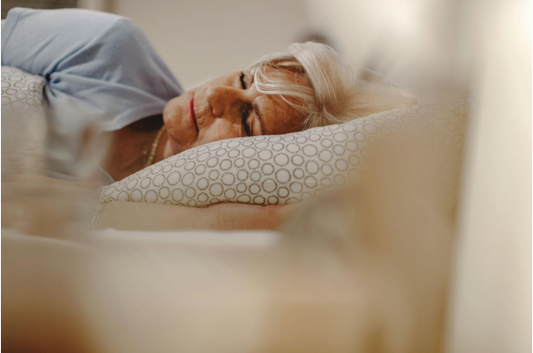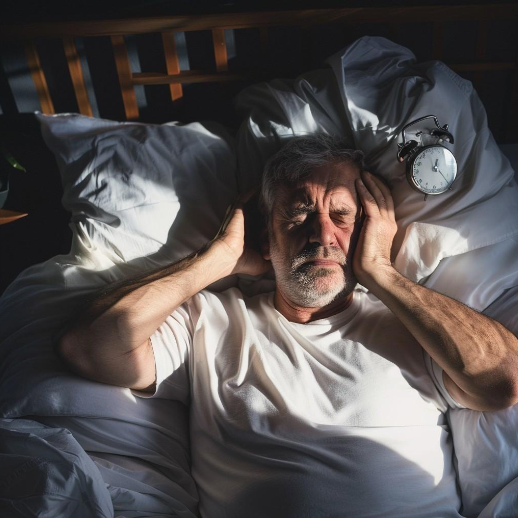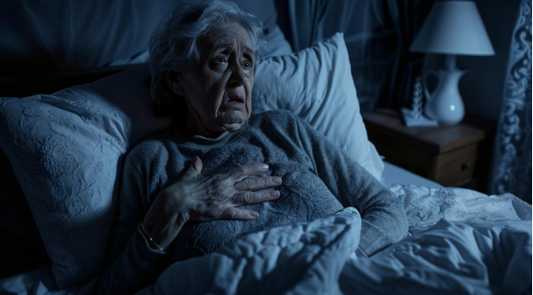Sleep is crucial for overall health, especially as we age. Many seniors struggle with sleep issues that can lead to fatigue and decreased well-being. Implementing a simple bedtime routine can make a big difference in enhancing sleep quality.
In this post, you'll discover straightforward tips designed to improve sleep hygiene for older adults. From creating a calming environment to establishing consistent bedtime habits, these strategies are easy to follow and can help you wind down effectively.
Whether you’ve tried various solutions or are just starting to look for ways to sleep better, these practical approaches can help you find the rest you deserve. Explore how small changes can lead to a more restful night and a brighter morning.
Understanding Sleep Hygiene
Sleep hygiene refers to a set of practices and habits that are vital for promoting quality sleep. Just as physical hygiene prevents illnesses, sleep hygiene is essential for maintaining healthy sleep patterns. It includes everything from the environment in which you sleep to the routines you follow before bedtime.
What is Sleep Hygiene?
At its core, sleep hygiene encompasses various factors that influence how well you sleep. It's more than just going to bed early. Here are some important components:
- Consistent Sleep Schedule: Going to bed and waking up at the same time each day can regulate your body’s internal clock, making it easier to fall asleep and wake up.
- Comfortable Sleep Environment: Your bedroom should be cool, dark, and quiet. A comfortable mattress and pillows also play a significant role in how well you sleep.
- Limiting Stimulants: Avoid coffee, tea, and other stimulants in the hours leading up to bedtime. They can keep your mind alert when it should be winding down.
- Relaxation Techniques: Activities like reading a book, practicing deep breathing, or listening to calming music can signal your body that it's time to sleep.
- Avoiding Screens: The blue light emitted by smartphones, tablets, and TVs can interfere with your ability to fall asleep. Aim to turn off these devices at least an hour before bedtime.
Establishing good sleep hygiene is crucial for seniors who may experience changes in their sleep patterns.
Importance of Sleep Hygiene for Seniors
Good sleep hygiene is especially important for older adults who often face various health challenges. It greatly impacts overall health and well-being. Here’s why:
- Enhances Mental Health: Poor sleep can lead to cognitive decline, irritability, and even depression. By practicing good sleep hygiene, seniors can improve their mental clarity and mood.
- Supports Physical Health: Quality sleep strengthens the immune system and helps manage chronic conditions like diabetes and heart disease. When seniors sleep well, they often experience fewer health complications.
- Improves Daily Functioning: A good night’s sleep can enhance alertness and concentration during the day. This means seniors can participate more fully in activities they enjoy.
- Promotes Safety: Better sleep helps prevent falls and accidents that may occur due to fatigue or disorientation.
Incorporating good sleep hygiene practices isn’t just about sleeping better; it’s about improving overall quality of life. With a bit of effort and consistency, seniors can enjoy
more restful nights and brighter days. Are you ready to make some changes to your bedtime routine?
Creating a Simple Bedtime Routine
A bedtime routine can make a huge difference in how well seniors sleep. By setting up a simple, consistent routine, you can signal your body that it’s time to wind down. This section highlights key elements to consider when creating an effective bedtime routine.
Setting a Consistent Sleep Schedule
One of the best ways to improve sleep is by keeping a consistent sleep schedule. Going to bed and waking up at the same time daily helps regulate your body's internal clock.
Here are some benefits:
- Improved Sleep Quality: A consistent schedule helps you fall asleep faster and stay asleep longer.
- Better Mood: Getting enough sleep can boost your mood and reduce stress.
- Increased Energy: Regular sleep patterns can make you feel more energetic during the day.
- Healthier Aging: Consistent sleep contributes to better overall health in seniors, including improved heart health and cognitive function.
Think about picking a bedtime that allows you to get enough rest. Start by determining how many hours of sleep you need and plan accordingly.
Winding Down: Activities to Incorporate
Calming activities before bedtime can reinforce your sleep routine. Here are some effective ways to wind down:
- Reading: Choose a light, enjoyable book. Reading can take your mind off the day's stress and help you relax.
- Listening to Music: Soft music or nature sounds can create a peaceful atmosphere. It’s a great way to calm your mind.
- Gentle Yoga: Practicing some gentle stretches can relieve tension in your body. Consider simple yoga poses or deep breathing exercises to help relax.
- Meditation: Even a few minutes of meditation can clear your mind and lower anxiety. Try focusing on your breathing for a few minutes.
Consider combining these activities to create a routine that works for you. For example, read for 15 minutes, listen to calming music for 10, and then practice yoga for 5.
Creating a Restful Sleep Environment
Your bedroom environment plays a big role in how well you sleep. Here are some ways to optimize your space for better sleep:
-
Control Light: Make your room as dark as possible. Use blackout curtains if needed. Darkness signals your body that it's time to sleep.
- Adjust Temperature: A cooler room is often more comfortable for sleeping. Aim for a temperature between 60-67°F.
- Minimize Noise: Try using white noise machines or fans to drown out disruptive sounds. If you’re sensitive to noise, earplugs might help.
- Comfortable Bedding: Invest in a comfortable mattress and pillows that support your sleeping style. Soft sheets can enhance your comfort too.
Ensure your bedroom is a sanctuary for sleep. Keep it tidy and remove distractions like TVs or computers that can interfere with your routine.
By focusing on these elements, you can create a simple bedtime routine that promotes better sleep hygiene.
Lifestyle Tips for Better Sleep Hygiene
Creating a good sleep routine is essential for improving the quality of sleep. Simple adjustments in lifestyle can make a big difference. Here are some effective tips to help seniors foster better sleep hygiene.
Dietary Considerations
What you eat can play a significant role in your sleep. Some foods can help you sleep better, while others may keep you awake. Consider these dietary tips:
- Promote Sleep with Foods: Foods rich in tryptophan like turkey, bananas, and dairy products can help the body produce serotonin, which is connected to sleep. Whole grains such as oats and brown rice are also beneficial.
- Go for a Light Snack: If you're a bit hungry before bed, a small snack can work wonders. Think of a piece of fruit, a handful of nuts, or a bit of yogurt.
- Avoid Heavy Meals: Eating large meals close to bedtime can lead to discomfort, making it harder to sleep. Try to finish dinner at least two to three hours before going to bed.
- Limit Caffeine and Alcohol: Caffeine can interfere with sleep patterns, so it's best to avoid coffee, tea, and chocolate in the afternoon and evening. While alcohol may initially make you sleepy, it can disrupt sleep later in the night.
Managing Stress and Anxiety
Stress and anxiety can make it nearly impossible to relax. Here are techniques to help calm your mind and prepare for sleep:
- Meditation: Spend a few minutes each evening meditating. Focus on your breath and let go of any racing thoughts. Apps and online videos can guide you through simple meditation practices.
- Deep Breathing Exercises: Take a moment to consciously breathe. Inhale deeply through your nose, hold for a few seconds, and then exhale slowly through your mouth. Repeat this several times to lower your heart rate and promote relaxation.
-
Gentle Yoga or Stretching: Light stretching before bed can ease tension in the body. Consider simple poses that relax muscles and calm the mind.
- Gratitude Journaling: Write down three things you're grateful for at the end of the day. This can shift your focus away from stress and promote positive feelings, leading to better sleep.
Limiting Screen Time
In today's digital age, screens are everywhere. However, too much screen time before bed can negatively affect sleep. Here’s how to manage your screen exposure:
- Establish a Screen Curfew: Turn off devices like phones, tablets, and computers at least an hour before bed. This allows your brain to wind down naturally.
- Create a Relaxing Evening Atmosphere: Use this time to read a book, listen to calming music, or enjoy a hobby. These calming activities can help signal to your body that it’s time to rest.
- Use Night Mode Settings: If you must use screens, enable night mode features that reduce blue light. Blue light can interfere with melatonin production, a hormone essential for sleep.
- Consider Bedtime Routines: Make your bedtime routine more enjoyable by incorporating relaxing activities that don’t involve screens. This can help create positive associations with bedtime.
By making these adjustments in your diet, managing stress levels, and reducing screen time, you can significantly improve your sleep hygiene. Simple changes can lead to better sleep and a more refreshing night's rest. Wouldn't that be great?
Conclusion
Establishing a simple bedtime routine can significantly enhance sleep quality for seniors. By incorporating practices such as maintaining a consistent sleep schedule, creating a calming environment, and engaging in relaxing activities before bed, individuals can set the stage for a restful night.
Encouragement to start small can lead to big changes. Consider gradually introducing one new habit at a time.
What small step will you take tonight to improve your sleep hygiene? Remember, better sleep not only boosts mood but also overall well-being. Your journey to better sleep begins now.
P.S.
If you are having difficulty with sleeping, you are not alone. There are many folks out there who want to know what the most effective natural sleep aid is to get them back to snoozing again. Fix My Sleep is a great resource for all those who have trouble sleeping and are looking for innovative tips and sleep products to help them get a good night’s sleep.





